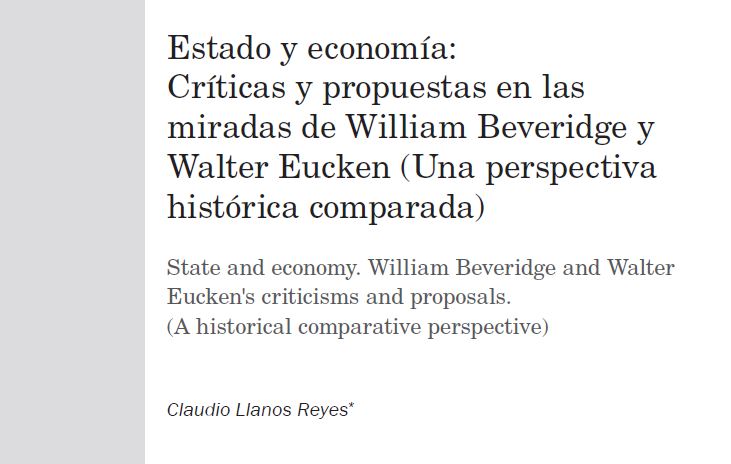State and economy. William Beveridge and Walter Eucken's criticisms and proposals. (A historical comparative perspective)
Main Article Content
Keywords
Walter Eucken, William Beveridge, Political Economy, Germany, Great Britain.
Abstract
The central problem that this paper addresses is the development of political economic thought, both in Germany and in Great Britain, related to the construction of societies in which the State had a role in ensuring levels of stability and economic security to its inhabitants, particularly during the late 1940s. This article proposes a comparative historical perspective of political economic thought of the British economist William Beveridge and his German counterpart Walter Eucken. The comparison is based on their critiques to the economic system and proposals on the role that the State should play in the economy. The study of the ideas of both thinkers, their criticisms and proposals on economic and political issues, allows us to understand the set of ideas that influenced the development of the Welfare State of the post war period, both in Britain and Germany.
Downloads
References
ADAMS, W. S. (1953). Lloyd George and the Labour Movement. Past & Present, 3, 55-64.
BAMBRA, C. (2007). Going Beyond. The Three Worlds of Welfare Capitalism: Regime Theory and Public Health Research. Journal of Epidemiology Community Health, 61(12), 1098-1102.
BEVERIDGE, W. (1937, febrero). An Analysis of Unemployment II. Economica, 4(13), 1-17.
BEVERIDGE, W. (1942). Social Insurance and Allied Services. London, RU: His Majesty´s Stationery Office.
BEVERIDGE, W. (1943). Social Security: Some Trans-Atlantic Comparisons. Journal of the Royal Statistical Society, CVI(IV), 305-332.
BEVERIDGE, W. La ocupación plena. México: Fondo de Cultura Económica.
BRADY, D. (2005). The Welfare State and Relative Poverty in Rich Western Democracies, 1967-1997. Social Forces, 83(4), 1329-1364.
CASTLES, F. et al. (2010). The Oxford Handbook of the Welfare State. Oxford, RU: Oxford University Press.
COUSINS, M. (2005). European Welfare States; Comparative Perspectives. Londres, RU: Sage.
DOBB, M. (1973). Theories of value and distribution since Adam Smith: Ideology and economic theory. Cambridge, RU: Cambridge University Press.
ERHARD, L. (1964). El orden social crea bienestar y seguridad. En L. Erhard (Ed.), La economía social de mercado. Barcelona, España: Omega.
ESPING-ANDERSEN, G. (1990). The Three Worlds of Welfare Capitalism. Oxford, RU: Polity Press.
ESPING-ANDERSEN, G. (2002). Why we need a New Welfare State? New York, NY: Oxford University Press.
EUCKEN, W. (1977) [1959]. Grudsätze der Wirtschaftspolitik. Munich, Alemania: Rowohlt Taschenbuch Verlag.
EUCKEN, W. (1999) Ordnungspolítik, Münster-Hamburgo, Alemania: Verlag.
EVANS, R. (2007). El III Reich en el poder. Barcelona, España: Península.
GARSIDE, R. (1990). British Unemployment 1919-1939: A Study in public policy. Cambridge, RU: Cambridge University Press.
GIDDENS, A. (2009). Europa en la era global. Barcelona, España: Paidós.
GILBERT, N. (2002). Transformation of the Welfare State: The Silent Surrender of Public Responsibility. Oxford, RU: Oxford University Press.
GOFFE, C. (1984). The Contradictions of the Welfare State. Londres, RU: Hutchinson.
GOODIN, R. (1988). Reason for Welfare: The Political Theory of the Welfare State. Princeton, NJ: Princeton University Press.
HALPERIN, C. et al. (1982). Comparative History in Theory and Practice: A Discussion. The American Historical Review, 87(1), 123-143.
HARRIS, J. (2003). William Beveridge: A Biography. Oxford, RU: Oxford University Press.
HAYEK, F. (1933). The Trend of Economic Thinking. Economica, 40, 121-137.
HAYEK, F. (1952). The Counter-Revolution of Science: Studies of the Abuse of Reason. Illinois, US: The Free Press.
HAYEK, F. (1958). Freedom, Reason and Tradition. Ethics an International Journal of Social, Political, and Legal Philosophy, 68(4), 229-245.
HAYEK, F. (1963) [1944]. The Road to Serfdom. Chicago, US: The University of Chicago Press.
HENNOCK, E. P. (2007). The origin of the Welfare State in England and Germany, 1850-1914. Cambridge, RU: Cambridge University Press.
HILL, A. & HILL, B. (1980). Marc Bloch and Comparative History. The American Historical Review, 85(4), 828-846.
HOBSBAWM, E. (2011). Cómo cambiar el mundo. Barcelona, España: Crítica.
KAUFMANN, F.-X. (2003). Varianten des Wohlfahrtsstaats. Francfurt am Main, Alemania: Suhrkamp.
KEYNES, J. M. (2006). Teoría general de la ocupación, el interés y el dinero. México: Fondo de Cultura Económica.
KRAUS, H.-C. (2011). Del cameralismo a la economía nacional. La tradición alemana de las ciencias políticas hasta comienzos del siglo XX. Historia 396, 1(1), 103-125.
LLANOS, C. (2010). El deber del Estado en el ordoliberalismo de Walter Eucken. Tradición y coyuntura en el manejo político-económico del Estado. Revista Chilena de Economía y Sociedad, 4(1-2), 15-27.
LORENZ, C. (1999). Comparative Historiography: Problems and Perspectives. History and Theory, 38(1), 25-39.
MILONAKIS, D. & FINE, B. (2010). From Political Economy to Economics. New York, NY: Routledge.
NOLTE, P. (2000). Die Ordnug der deutschen Gesellschaft. Selbstentwurf und Selbstbeschreibung in 20. Jahrhundert. Munich, Alemania: Verlag C. H. Beck.
OLABÁRRI, I. (1993). Qué historia comparada. Studia Histórica. Historia Contemporánea, 10-11, 33-76.
PEUKERT, H. (2010). Walter Eucken (1891-1950) and the Historical School. En P. Koslowski, (Ed.), The Theory of Capitalism in the German Economic Tradition. Heildelberg, Alemnania: Springer Verlag.
RITTER, G. (1983). Sozialversicherung in Deutschland und England. Munich, Alemania: Verlag C. H.
RITTER, G. (1991). Der Sozialstaat. Entstehung und Entwicklung im internationalen Vergleich. Munich, Alemania: Oldenburg.
ROADBERRY, S. & O`ROURKE, K. (2010). The Cambridge Economic History of Modern Europe, vol. 2. Cambridge, RU: Cambridge University Press.
SCHILDT, A. & SIEGFRIED, D. (2009). Deutsche Kultur Geschichte. Munich, Alemania: Carl Hanser Verlag.
SCHMIDT, M. (2007). Der Wohlfahrtsstaat. Eine Einführung in den historischen und internationalen Vergleich. Wiesbaden, Alemania: VS.
SCHUMPETER, J. (1984). Capitalismo, socialismo y democracia. Barcelona, España: Folio.
SCHUMPETER, J. (1995). Historia del análisis económico. Barcelona, España: Ariel.
SEWELL, W. (1967). Marc Bloch and the Logic of Comparative History. History and Theory, 6(2), 208-218.
TOOZE, A. (2008). The Wages of Destruction. New York, NY: Penguin.
ULLRICH, C. (2005). Soziologie des Wohlfahrtsstaates: Eine Einführung: Francfurt, Alemania: Campus.
VAN DEN BRAEMBUSSCHE, A. A. (1989). Historical Explanation and Comparative Method: Towards a Theory of the History of Society. History and Theory, 28(1), 1-24.
WAGNER, A. (2008). Die Entwicklung des Lebenssatndars in Deutschland zwischen 1920 und 1960. Berlín, Alemania: Akademie Verlag.
WATKINS, J. W. N. (1953). Walter Eucken, Philosopher-Economist. Ethics, 63(2): 131-136.

